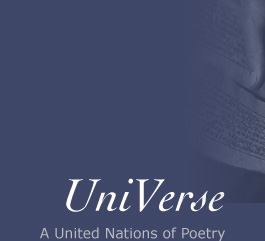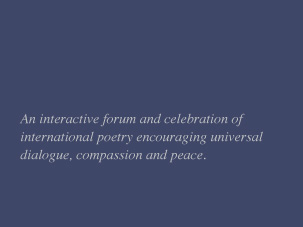| |
 |
 |
 |
Li Sen was born in 1966
in Tengchong County, Yunnan Province, People's Republic of China.
He has been working at Yunnan University since he graduated from
the Department of Chinese at Yunnan University in 1988. Currently,
he is professor and Dean of the School of Arts and Design at
Yunnan University. He has published more than 300 poems, essays,
and academic papers in a number of domestic and international
magazines and journals, including Hua Cheng
(Flower City), Writers,
People's Literature, and Reading. He has published six books,
including Shadows on the Canvas (Dongfang Publishing House, 2000),
Accounts of Animals (Huacheng Publishing House, 2002), Painters
in My Heart (Guangxi Normal University Press, 2002), Birds'
World (China Workers' Publishing House, 2004), Absurd
but Attractive Games (Xuelin Publishing House, 2004), and Cangshan
Night Talk (Xuelin Publishing House, 2006). In addition, he has edited three
books and co-edited another two. He is one of the poets known
as "They," an influential poetry group of China. A bilingual collection of his poetry, Chinese
Windmill, is forthcoming from Virtual Artists Collective.
|
 |
 |
Chinese
version
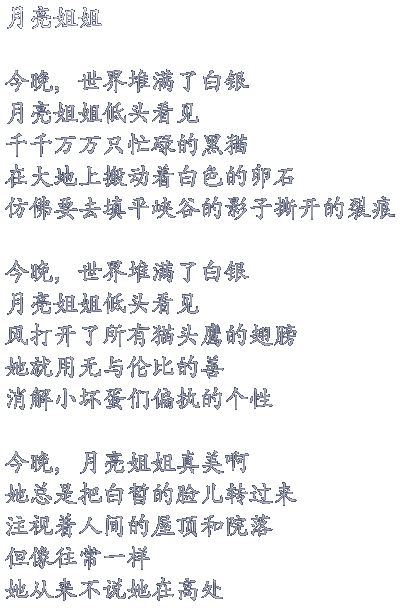
|
English
version
Sister Moon
Tonight, the world is piled high with silver.
Sister Moon looks down and sees
millions and millions of bustling black cats
moving white cobblestones on the ground
as if to fill the chasm torn by the shadow of the valley.
Tonight, the world is piled high with silver.
Sister Moon looks down and sees
that the wind has spread the wings of all the owls.
With her peerless benevolence
she consumes the little scoundrels.
How beautiful sister moon is tonight!
She always turns her fair face
to watch the roofs and courtyards of the human world,
her image constant, yet
she never speaks down from on high.
(Translated by Wang Ho and Steven Schroeder.
Reprinted from Chinese Windmill, Virtual Artists Collective, 2007.) |
Chinese
version
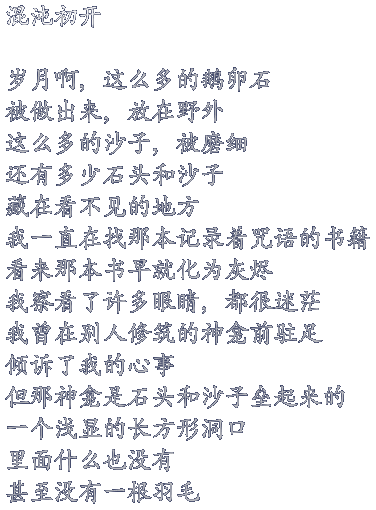
|
English
version
Primordial Chaos
Time, so many cobblestones
placed in wilderness,
so much sand ground fine.
How many stones, how much sand
hidden out of sight?
I have been looking for the book of incantations
but it seems it has long since turned to ash.
I have gazed into many eyes, all vague and absorbed.
I once stopped at a shrine built by others,
poured out my heart.
But the shrine was a pile of sand and stones
a long shallow pit
with nothing inside
not even a feather.
(Translated by Wang Ho and Steven Schroeder.
Reprinted from Chinese Windmill, Virtual Artists Collective, 2007.) |
Chinese
version
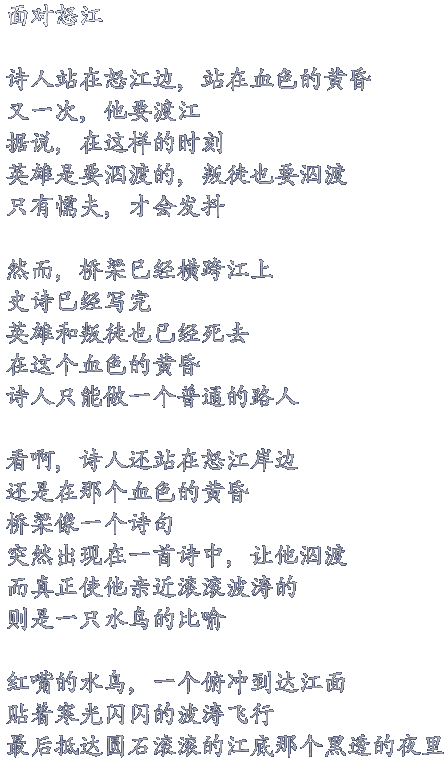
|
English
version
Confronting Nujiang
The poet stands on the bank of Nujiang River, stands at blood-red dusk.
Once again, he must cross.
They say at such moments
heroes will swim it and traitors will swim it too.
Only cowards tremble.
But a bridge has been built over the river.
The epic has been written.
Heroes and traitors have died.
At this blood-red dusk
The poet can be only one of the common passersby.
Look, the poet still stands on the bank of Nujiang River,
still at that blood-red dusk.
The bridge, like a line,
appears suddenly in a poem, lets him swim across.
But what really brings him close to billowing waves
is the metaphor of a waterfowl,
a red-billed waterfowl that dives down to the surface of the river,
flits over cold light glittering on great waves,
pierces finally to the countless round stones in the dark night of the river bottom.
(Translated by Wang Ho and Steven Schroeder.
Reprinted from Chinese Windmill, Virtual Artists Collective, 2007.) |
|
 |
|
